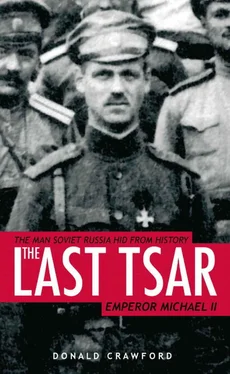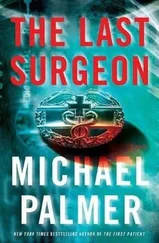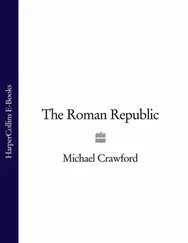The Church of St. Savva, on the ground floor of a modest three-storey building at Veithgasse 3, was hardly known outside the world of the émigré Serbs living in Vienna. The bearded priest-in-charge, Father Misitsch, was a worldly man greatly impressed by the enormous fee he was being offered for an hour or so on a quiet Tuesday afternoon — 1,000 Austrian crowns ($5,000 in today’s money), according to informed gossip afterwards. 18To make it even better business, the two witnesses were members of his own family, including his wife Vrikosova. 19
None were vulnerable to any threat from the Okhrana ; as for the banns, the names mumbled each Sunday morning were stripped of any rank, and meant nothing to the half-attentive Serbs in his congregation. Nobody of importance married at St. Savva; whoever Michael Romanov might be — or Rom’nov in the mumbled mouth of Father Misitsch — he was no one of any interest.
Matveev also arranged the necessary residential qualification for Michael and Natasha, even though they were not there. Officially, for the purposes of the marriage register, they would be said to be living at Johannesgasse 23, which thus disguised the fact that it was actually a modest hotel, the Tegetthof — a hotel was not sufficient for residential qualification — managed by one of Father Misitsch’s Serbian flock, and a man more than agreeable to the good business Matveev had on offer for ‘borrowing’ his private flat in the hotel. 20After all, Michael and Natasha were not going to live there, and would not be in the hotel for more than an hour or so, while they freshened up after their journey.
Since Michael was fully briefed on the arrangements, and knew precisely where he was to be and at what time, Matveev was clearly in telegraphic contact with someone other than Michael, given that any cable to him ran an unacceptable risk of being intercepted by a paid Okhrana informant.
Michael’s valet and chauffeur were both absolutely trustworthy, and his chauffeur certainly knew what was afoot when he took over the car at Wurzburg, and put it on a train. It can be assumed, therefore, that one or both were party to the plan, and key to its success, though there is no trace of their complicity —or of anyone else’s.
Suffice that at 4 p.m. on Tuesday, October 16, 1912, when Michael and Natasha arrived at the church to be greeted by Father Misitsch and his two witnesses but no one else, it was exactly as they expected it to be. 21Shortly afterwards they were married and signing the register in their full and proper names. With that done, they left Vienna immediately and caught the train to Venice. The Okhrana had been outwitted and made to look like fools.
It was the briefest of honeymoons: next day they were in Vienna, three days later they were in Milan, and then a week after their marriage, on Tuesday, October 22, 1912, 22they turned up at the lavish Hotel du Parc, a little later than they had ‘promised’ the Okhrana , but not so much later that the Okhrana were in any way troubled. They had been out of sight for only a week; nothing could have happened in that time.
Within the next week, Matveev — now Michael’s brother-in-law —turned up at the hotel with his wife Olga, bringing with them little George and Tata. The Gatchina house had been locked up and secured; the children were safely out of Russia.
Michael and Natasha were free. Farewell, Gatchina. Farewell Russia. They would live in England.
AT the Alexander Palace in Tsarskoe Selo, the news of his marriage produced consternation. There was no doubt in Nicholas’s mind about where the blame lay —‘that woman’ as his wife Empress Alexandra sneeringly described Natasha. Nicholas was no less condemning: ‘She’s such a cunning, wicked beast that it’s disgusting even to talk about her’, he wrote to his mother after Michael’s runaway marriage. 23
The marriage itself had come as shock enough when Michael confessed it afterwards, but what added to the fury of Nicholas and Alexandra, and their court at Tsarskoe Selo, was that it was sprung upon them shortly before the long-planned celebrations marking the tercentenary of the Romanov dynasty in 1913 — and more to the point, to demonstrate that the Romanovs, who had faced ruin eight years earlier in the 1905 Revolution, were back on top. A scandal involving the brother of the Tsar was hardly a welcome prelude to a year intended to boost the prestige of the imperial family across the nation. That fact in itself dictated what the response would be.
At first there had been hopes that the runaway marriage could be kept a secret, thus avoiding public humiliation, at least until after the tercentenary celebrations, scheduled to end in June. That was the immediate response of Michael’s mother, the Dowager Empress Marie, when she received Michael’s letter on November 4, 1912, at her holiday home in Denmark.
As she wrote at once to Nicholas: ‘I only ask that it should remain a secret, so there shouldn’t be another scandal, there have been other marriages in secret, which everyone pretended not to know about. I think it’s really the only thing that can be done now, otherwise I won’t be able to show myself any more, it’s such a shame and disgrace .’ 24
Nicholas, as appalled as his mother, agreed with her — ‘My first thought was also to keep the news quiet’— though he doubted that it could remain a secret. ‘Sooner or later everyone here will find out.’ 25Nevertheless, the hope persisted that somehow the marriage could be covered up. In a ten-point memorandum drawn up at Tsarskoe Selo by the elderly court minister Baron Fredericks, but with a nagging and vindictive Empress Alexandra at his elbow, the idea was that Michael would be granted eleven months’ leave of absence — keeping him out of the way until after Nicholas had basked in the applause of the nation — and then, if he had still not divorced Natasha, he could expect very severe punishment. Meanwhile, to ensure that she could not get her hands on his money, his estates would be put under guardianship. The view of the inner circle was that Michael had acted unconsciously ‘under the hypnotic influence of a malicious vamp’ who was now to be banned ‘from Russia forever …as somebody who has demonstrated criminal disregard for the Head of State and publicly injured the dignity and status of a member of the Imperial House.’ 26
With this hasty and desperate response in place, Michael’s former trusted ADC Captain A. A. Mordvinov, a man who had come to hate Natasha as much as she despised him, was swiftly despatched in early November 1912 to Cannes and the Hotel du Parc which Michael had made his family base for the past three weeks — still under surveillance by the complacent agents of the Tsar’s secret police, the Okhrana, as yet wholly unaware that the marriage they were there to prevent had already taken place, and that their mission had failed utterly.
Mordvinov’s was no more successful. Michael found him ‘difficult to understand for he was nervous’ — hardly surprising given his task of delivering the Tsarskoe Selo ultimatum of ‘divorce her or else’.
The Tsar had appointed ‘the good Mordvinov’ as one of his own ADCs and that switch of loyalties was enough to ensure an uneasy audience. Michael, who felt betrayed by him, told him brusquely to go away and not come back. ‘We are no longer on good terms’, Michael wrote to Nicholas. He then set out his own settlement of the issue: that he and Natasha should return to Russia to live quietly outside the public gaze, that she should be given the title of Countess, and that — despite the threats passed on by messenger Mordvinov — he was to retain full control ‘of his personal fortune and property’. 27
Читать дальше












